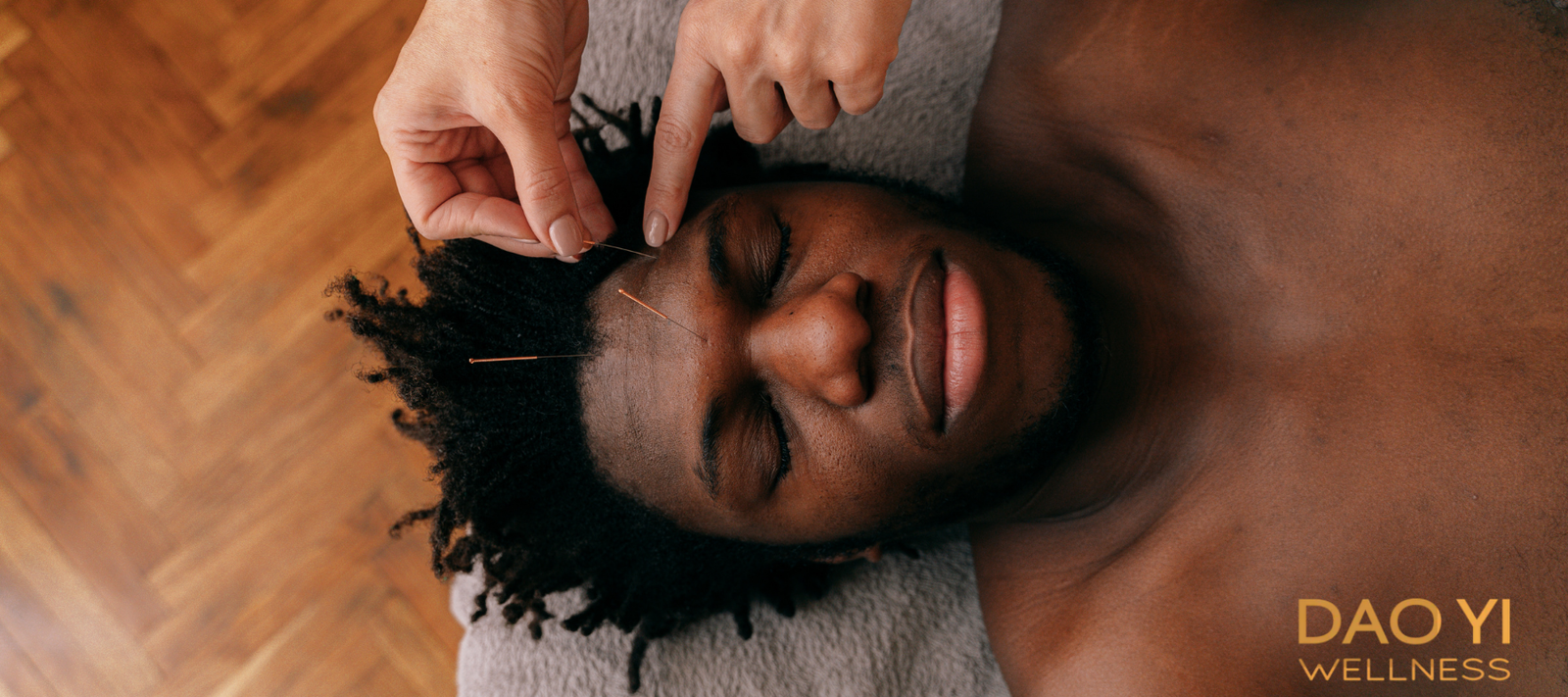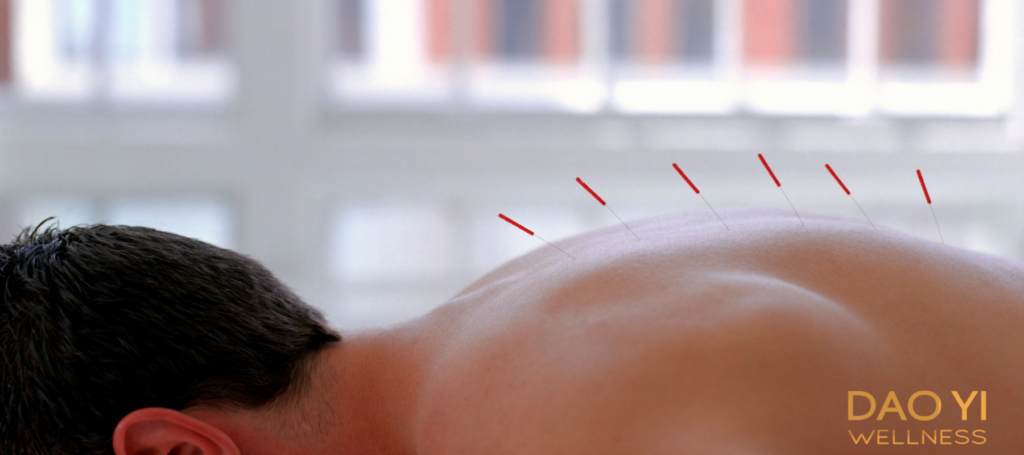How Acupuncture Can Help With Chronic Pain For Veterans
By: Dao Yi Wellness
For many Canadian veterans, chronic pain is more than a lingering discomfort, it’s a daily reality that impacts quality of life, mobility, and mental health.
Whether caused by injuries sustained in service, the physical demands of training, or the natural wear‑and‑tear of military life, pain can persist long after service ends.
Traditional treatments such as prescription medications and surgery remain important, but there’s growing interest in complementary approaches that offer fewer side effects and holistic benefits.
One such approach acupuncture has been gaining traction among veterans and healthcare providers alike.
Let’s find out why below.
Understanding Chronic Pain In Veterans
Veterans are at a higher risk of developing chronic pain compared to the general population. According to Statistics Canada, over one in three veterans experience chronic pain, compared to about one in five Canadians overall.
Common causes include:
- Combat or training injuries.
- Musculoskeletal strain from carrying heavy loads.
- Repetitive stress from physical tasks.
- Service‑related surgeries and recovery complications.
Many veterans also face co‑existing conditions such as post‑traumatic stress disorder (PTSD), depression, and anxiety — all of which can worsen the perception and intensity of pain.
What Is Acupuncture?
Acupuncture is an ancient healing practice originating from Traditional Chinese Medicine (TCM). It involves inserting ultra‑thin needles into specific points on the body to influence the flow of energy, known in TCM as qi (pronounced “chee”), along pathways called meridians.
From a modern medical perspective, acupuncture stimulates the nervous system, triggering the release of endorphins (the body’s natural painkillers), improving blood flow, and influencing the brain’s pain perception mechanisms.
How Acupuncture Targets Chronic Pain
Acupuncture works on multiple levels to address chronic pain:
- Stimulating The Nervous System – Signals are sent to the spinal cord and brain to release neurotransmitters that reduce pain.
- Increasing Blood Flow – Enhanced circulation helps deliver oxygen and nutrients to damaged tissues, promoting healing.
- Triggering Natural Pain Relief – Endorphins and other natural chemicals help block pain signals and improve mood.
These combined effects can lead to both short‑term relief and long‑term improvements in pain management.
Conditions Acupuncture Can Help Address In Veterans
Many veterans report improvement in the following conditions with acupuncture:
- Chronic Back Pain – One of the most common service‑related issues.
- Joint And Musculoskeletal Pain – Knees, hips, shoulders, and spine.
- Headaches And Migraines – Often linked to neck tension or post‑concussion syndrome.
- Neuropathy And Nerve Pain – Common after injury or surgery.
- Fibromyalgia And Myofascial Pain Syndrome – Widespread muscle pain and tenderness.
Evidence And Research On Acupuncture For Pain Management
The scientific community has increasingly recognized acupuncture as a valid treatment for chronic pain.
- The World Health Organization (WHO) lists acupuncture as an effective treatment for various pain conditions.
- A 2020 review in JAMA Internal Medicine found acupuncture significantly reduced chronic pain intensity and improved function.
- Studies in veteran populations in the U.S. Veterans Health Administration have shown measurable improvements in pain, sleep quality, and overall well‑being.
While more Canadian‑specific research is needed, these findings are promising for integrating acupuncture into veterans’ healthcare plans.
Acupuncture’s Role In Reducing Dependence On Medications
The opioid crisis has underscored the need for non‑drug pain management solutions. Veterans, in particular, have been prescribed opioids at higher rates than the general population.
Acupuncture can help by:
- Reducing the frequency and intensity of pain.
- Providing a drug‑free pain relief option.
- Supporting gradual reduction of prescription medication under medical supervision.
Integrative programs combining acupuncture with physiotherapy, counselling, and lifestyle interventions have shown success in reducing long‑term reliance on painkillers.
Mental Health Benefits For Veterans
Chronic pain doesn’t exist in isolation — it often fuels anxiety, depression, and PTSD. Acupuncture has been shown to:
- Calm the nervous system.
- Reduce stress hormone levels.
- Improve sleep quality.
- Enhance overall emotional resilience.
By addressing both the physical and emotional dimensions of pain, acupuncture can help veterans achieve better long‑term outcomes.
Acupuncture Treatment Process For Veterans
A typical acupuncture session involves:
- Assessment – The practitioner reviews your medical history, pain symptoms, and goals.
- Needle Placement – Sterile, single‑use needles are inserted into specific points.
- Relaxation Period – You rest for 20–40 minutes while the needles do their work.
- Post‑Treatment Feedback – You may receive advice on self‑care, stretches, or follow‑up sessions.
Most veterans notice improvement after several sessions, with treatment plans often lasting 6–12 weeks for chronic pain.
Complementary Therapies Often Used Alongside Acupuncture
Acupuncture is often part of a broader pain management plan, which may also include:
- Massage Therapy – Relieves muscle tension and improves circulation.
- Physiotherapy – Strengthens muscles and improves joint function.
- Mindfulness And Meditation – Helps manage stress and pain perception.
- Exercise And Mobility Programs – Supports long‑term recovery.
Coverage And Accessibility For Veterans In Canada
Veterans Affairs Canada (VAC) may cover acupuncture treatments as part of a prescribed pain management plan. In addition:
- Some extended health benefits include acupuncture coverage.
- Community health clinics may offer reduced‑cost services for veterans.
- Always verify your practitioner is licensed in your province or territory.
Potential Risks And Considerations
Acupuncture is generally safe when performed by a licensed professional, but possible minor side effects include:
- Bruising or soreness at needle sites.
- Temporary light‑headedness.
Veterans with bleeding disorders, certain skin conditions, or implanted devices like pacemakers should consult their physician before starting treatment.
Success Stories From Veterans
Many veterans report dramatic improvements after adding acupuncture to their care:
- Reduced daily pain levels.
- Increased mobility and flexibility.
- Lower reliance on prescription pain medication.
- Improved mood and sleep patterns.
Conclusion
For Canadian veterans living with chronic pain, acupuncture offers a safe, evidence‑based, and holistic approach to relief. By addressing both the physical and emotional sides of pain, it can help restore quality of life, reduce medication dependence, and improve overall well‑being.
If you’re a veteran considering acupuncture, speak with your healthcare provider about integrating it into your pain management plan — your body and mind may thank you.
If you have any questions about our article
Frequently Asked Questions
What Is Acupuncture And How Does It Work?
Acupuncture uses fine needles to stimulate points on the body, triggering natural healing and pain relief mechanisms.
Is Acupuncture Safe For Veterans With Old Injuries?
Yes, when performed by a licensed practitioner who understands your medical history.
How Many Acupuncture Sessions Do I Need Before Feeling Results?
Some notice improvement after 1–3 sessions, but chronic conditions may require 6–12 sessions.
Can Acupuncture Help With PTSD And Chronic Pain Together?
Yes. Acupuncture can calm the nervous system, reduce anxiety, and alleviate pain.
Does Veterans Affairs Canada Cover Acupuncture Treatments?
VAC may cover acupuncture as part of an approved treatment plan — check with your case manager.
Can Acupuncture Reduce My Need For Pain Medication?
Many veterans find they can reduce medication with regular acupuncture, under medical supervision.
How Do I Find A Licensed Acupuncturist In My Area?
Search your provincial regulatory body’s directory or ask for referrals from healthcare providers.
Is Acupuncture Painful?
Most people feel minimal to no pain — often described as a tingling or warm sensation.
Are There Side Effects To Acupuncture?
Minor soreness or bruising can occur, but serious side effects are rare with qualified practitioners.
How Long Do The Benefits Of Acupuncture Last?
Benefits can last from days to weeks. Regular sessions help maintain improvements over time.


